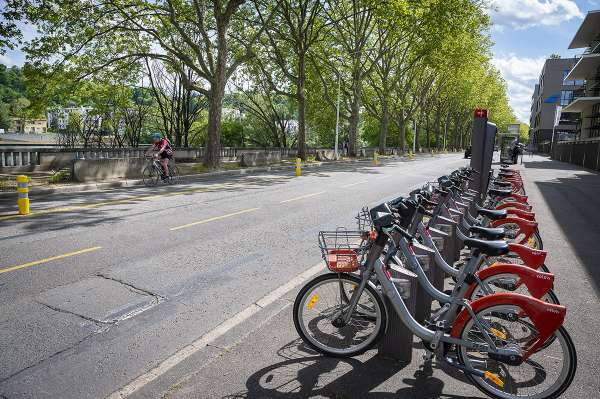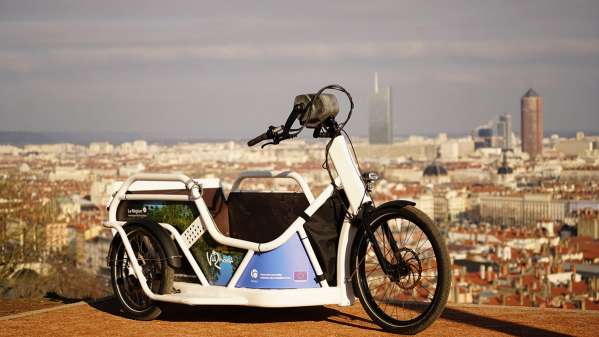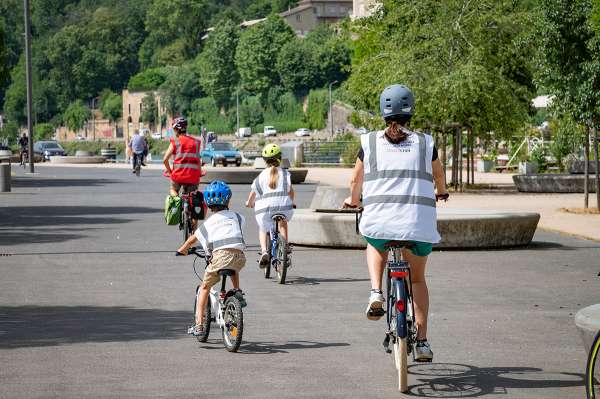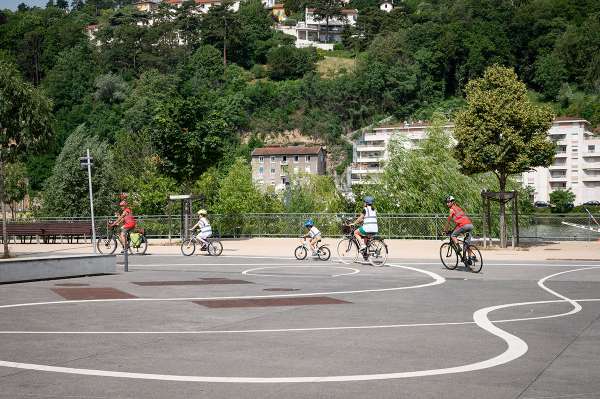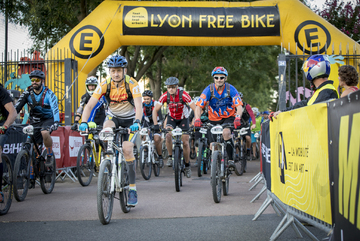Saddle up!

As you may have noticed, cycling is on the up. But what is driving this trend? How are cyclists reclaiming the streets? What do you need to know before giving it a go? Hop on and we’ll give you the low-down!
We could have made up a fairy tale: “Once upon a time, Lord Cycle made a two-wheeled contraption to set off in search of his beloved. Or, better yet, Lady Cycle came up with an idea for a fantastic machine to flee from an arranged marriage…” It would have been fun, but no. From the appearance of the dandy-horse in 1817, to the arrival of the electric bike, via the addition of pedals, tires and brakes, the story of the bicycle has been a long, arduous journey, built on the ingenuity of inventors, who gradually improved the comfort and safety of velocipedes.
In the first half of the twentieth century, at the dawn of the automobile age, the bicycle as we know it today reached a peak. Little by little, it was neglected in favour of motor vehicles, before making a comeback in cities, towns and villages in the 1980s, with BMX bikes, mountain bikes, electric bikes, fixie bikes, gravel bikes and more. There were many reasons behind the return to grace of cycling, both as a sport and a means of getting around.
“A bicycle offers freedom and happiness,” sums up Fabien Bagnon, Vice-President of Greater Lyon, in charge of roads and active mobility: “It is a gentle activity that benefits health and fights against sedentary lifestyles. It offers the pleasure of being outdoors and seeing the city in a different way, while making it easier to get around and manage your journey times. It is of course a virtuous transport mode as it does not pollute. Another key argument in its favour, given soaring fuel prices, is the low running cost.”
The call of the bicycle
In 2005, the arrival of Vélo'v, a self-service cycle hire scheme, encouraged the people of Lyon to return to this means of transport. After enjoying steady growth over the years, there was a spike following the end of the pandemic, with a 25% increase in the annual number of users.
One of these users, Emma, got into cycling after the lockdown to explore the city alongside her husband Renaud, an experienced cyclist, and their three children: “Over the past two years, it’s been a real pleasure to get around Lyon by bike, and go on daytrips or weekend breaks.”
According to Fabien Bagnon, “demand for family bikes is growing fast and electric bikes have really changed the landscape: they enable greater distances to be covered and can be used by a wide audience, including the elderly.” Emma, who lives in the Croix-Rousse confirms this: “I invested in an electric bike so the city’s topography wouldn’t be an obstacle.” With the increasingly popular electric bicycle, cyclists can access all parts of Lyon, including its hills and steep slopes.
What’s more, electrical assistance makes it easier to carry passengers (like children or pets) on cargo bikes and opens up the metropolitan area’s cycle paths to population segments you might not expect, like wheelchair users. This is one of the solutions provided by the company Comhic, with its inclusive electrical assistance model: Benur.
In the fast lane
Everybody is getting on board with cycling! According to Fabien Bagnon, “We have pursued an ambitious cycle transport plan, to speed up adoption of cycling, and now we have to manage the huge increase in users!”.
To meet this rising demand and consolidate both family and business usage (including cycle logistics and bicycle use by artisans), a large network of continuous routes, which are clearly marked out, comfortable and separate from cars, is gradually being rolled out.
With Les Voies Lyonnaises, works for which will be completed in 2030, 13 lines will serve 40 towns out of the 59 that make up Greater Lyon’s metropolitan area. The first section, along Quai Claude Bernard, was inaugurated in July 2022. “Safety is also a major challenge,” emphasizes the town councillor, mentioning the creation of 15,000 cycle stands, parking spaces in car parks and experimentation with metered parking.
“It’s getting more and more pleasant to cycle in Lyon. I often cycle to Oullins from the Croix-Rousse. It’s far more direct and faster than by public transport, and the route is well protected from car traffic,” Emma told us.
Emma and Renaud have really got the cycling bug and no longer think twice about cycling beyond the region. They have become 2022 ambassadors for the cycle route Eurovelo 4 (known as ‘La Vélomaritime’): “It took us a week to cycle from Le Havre to Dunkerque, after travelling from Lyon by train".
This is a highly promising travel model, at a time when cycling is becoming one of the mainstays of slow tourism…
Practical tips
PURCHASE
You can still benefit from financial assistance from Greater Lyon to buy a bike. It covers electric bikes, cargo bikes and reconditioned second-hand mechanical bikes. The assistance has been increased, and can be retroactive, but is subject to income conditions.
For further info, visit: grandlyon.com/services/aide-achat-velo.html
EXPLORE
You will find many themed outings at visiterlyon.com and comhic.com
FOLLOW
To follow Emma and Renaud’s cycling adventures, check out their Instagram account @encre_violette
A chat with Delphine Dépraz
Co-director of the association Maison du Vélo
Are you keen to join the ranks of the cyclists, but unsure about what you need to get started? And what about cycling with kids?
We bring you some pro tips from the association Maison du Vélo.
What kit do you need for urban cycling
Your choice of bike is crucial; it needs to suit your size and usage. Typically, dual suspension bikes are not really suitable for daily journeys. You can find more and more models, like hybrid bikes, that can serve a dual purpose, fitted with wide tyres for weekend outings and a mudguard and luggage rack for commuting.
I would recommend buying your bike at a specialist shop, or seeking advice to choose a model and adjust it, because there are many ways to make it comfortable for you.
Speaking to a specialist will also help ensure you have all the gear you need to comply with the rules of the road, including a bell, brakes, reflectors and lights. You also need one (or maybe even two) U-locks, and a cycling cape or jacket.
When cycling, visibility is crucial for safety, so bright colours are a must and you should wear a high-vis vest. Helmets are not mandatory for cyclists aged over 12. However, we do recommend a helmet for anyone taking up cycling or doing it for sport. All helmets sold new on the French market are approved. If you notice any sign of wear, or in the event of a serious fall, it is important to change it.
What advice do you have for cycling as a family?
You should start by checking your children’s abilities and limits in a safe area, like a park, and then try a journey that you know well, going a bit further each time. Children’s bicycles are very low, so you can make them more visible by attaching a pennant to them.
Before setting off, check all your equipment and remind everybody of the essential safety rules. While cycling, communicate using clear, precise language. Position yourself so as to protect your children and encourage other vehicles to slow down and make space: cycle behind them, in a straight line, keeping slightly to their left (Translator’s note: remember that people drive on the right side of the road in France!). As of September, we will be sharing all of these good practices through a free training session: ‘Ma famille à vélo’ (My cycling family).
For a longer outing, tagalong bikes, or a tow bar to attach a child’s bicycle to yours, can be a good solution.
Can you recommend any routes off the beaten track to try?
The Voie Bleue, a long-distance bicycle route, which runs from Lyon, along the banks of the Saône, all the way to Luxembourg.
On weekends and weekdays (outside commuting hours), bicycles are now allowed free of charge on the T3 tramway line, which will take you all the way to Décines Grand-Large, where you can take a ride along the water’s edge.
With the app Geovelo, you can locate safe cycling routes (along green ways and cycle paths for example). You may even discover a few hidden cycling paths around your home!
Here, you will find a rental area open to members where you can try equipment such as tailers, bicycle racks, and child seats. For cyclists who are not yet comfortable riding in the city, the association has partnered up with the Greater Lyon authority to provide training to cycle with peace of mind: Covelo.
Ride 'A la Lyonnaise'
Bicycle lovers
Etablicyclette
Because nobody will care for your bicycle as well as you do, the association Etablicyclette enables its members to repair their own trusty steed. In this friendly place, driven by a passion for cycling, nobody is left behind. After a thorough inspection of each bicycle, to identify problems that need fixing, the volunteers and mechanics provide all the tools needed for the job. It is then up to the bicycle’s owner to get their hands dirty.
The stated aim is to teach you how to identify and repair problems yourself, in order to help grow the practice of cycling. If you have an unused bicycle lying around, you can donate it to the association, which will use it to add to its stock of spare parts.
Cycling culture
Grimpeurs
Are you a cyclist who loves hybrid places? If so, then this place is for you! In this space dedicated to sports cycling, you will find a coffee shop and restaurant, as well as a concierge service, shop, repair shop, hire service, book shop, training area and more.
2 rue d’Oran, Lyon 1stgrimpeurs.cc
Energy boost
Centaur Bike
Is an electric bicycle out of your budget range? If so, you could consider electrifying your regular bike with a battery made in France (Lyon, Avignon) or Germany (Dresden). This is a reliable way to transform your bike into a light, high-performing model, at a lower cost.
In addition to this service, Centaur also sells new and second-hand electric bicycles and carries out repairs.
28 Grande rue de la Croix-Rousse, Lyon 4thcentaurbike.com
A sporting and socially engaged cycling event
Lyon Free Bike
Would you like to try a fresh experience away from the river banks and hills?
Want to explore Lyon in a new light? Try the Lyon Free Bike adventure!
Based on a totally new urban concept since 1995, this event allows cyclists to take over the city.
Opening up access to streets, paths, stunning viewpoints, secret passages and challenging slopes, there are three trials on offer: a 45-km sports route to conquer new urban spaces; a socially engaged 25 km route, ‘Rouler pour Elles’, where part of the registration fee is donated to women’s cancer charities; and a 20 km discovery route that is perfect for a family outing.
And, you can get your cycling-packed weekend started at the first edition of the Lyon Vélo Festival, to be held at Gerland Park. This sporting, engaged and responsible event combines races for charity (including mountain biking, gravel biking and ultra-cycling), with routes ranging from 40 to 400 km (yes, you read right!), exhibitions, introductory courses, trials, demonstrations, workshops and more.
